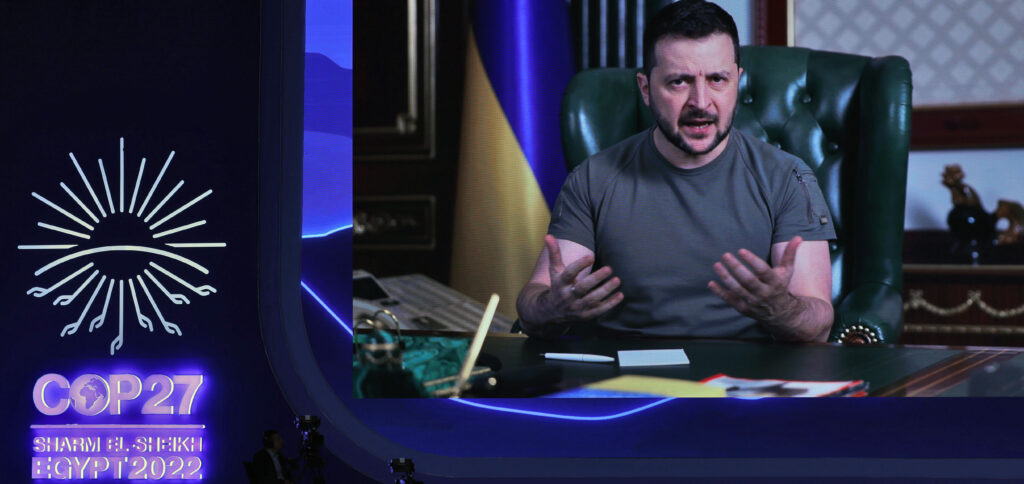
The second day that leaders took the stage COP27 began with strong speeches from Gaston Browne, Prime Minister of Antigua and Barbuda, and Macky Sall, President of Senegal.
“We are funding our own adaptation efforts when we are victims, which means we are being punished twice, and we are not ready to put up with that,” said Macky Sall.
In his speech, Browne, who speaks on behalf of the Alliance of Small Island States, highlighted the theme of climate finance, warning of the fact that the US$ 100 billion promeachieved by 2020 are not yet a reality. “We will fight tirelessly for climate justice, including in international courts,” he said.
It is worth remembering that climate finance (or climate financing) refers to the money that will be allocated to actions to mitigate and adapt to climate change.
ADVERTISING
The Prime Minister of Antigua and Barbuda also said that small island nations want big oil companies to pay for the increasing damage from rising sea levels and climate change, caused by the increase in carbon stocks in the atmosphere.
“The oil and gas industry continues to earn nearly $3 billion daily in profits. It is high time these companies pay a global carbon tax on their profits as a source of financing for losses and damages. Wasteful fossil fuel producers have benefited from extortionate profits at the expense of human civilization. While they are making profits, the planet is burning,” he stated.
Another who spoke this Tuesday (8) was António Costa, Prime Minister of Portugal. He highlighted that the country managed to mitigate many of the effects of the energy crisis, caused by the war in Ukraine, due to heavy investments in renewable energy.
ADVERTISING
“Portugal, which started investing in renewable energy 15 years ago, is an example of how investing in the transition ensures we are safer from a fuel emergency,” he said.
In his speech, Costa spoke about Brazil by highlighting the commitment of the elected president, Luiz Inácio Lula da Silva, to eliminate deforestation in the Amazon.
The prime minister of the island country of Tuvalu was the first to call at COP27 for a fossil fuel non-proliferation treaty.
ADVERTISING
“Warming seas are beginning to swallow our lands – inch by inch. But the world's addiction to oil, gas and coal cannot sink our dreams beneath the waves,” said Natano, in a call to the UN summit.
The president of Venezuela, Nicolás Maduro, highlighted the lack of action by countries in recent years, despite advances in climate science.
“We still remember [the 2009 climate summit] in Copenhagen, we still remember the police brutality of the street crackdown on social movements and what has happened since then. We've lost a lot of time since then. Every hour, every month, every year, we hesitate,” he said.
ADVERTISING
This Tuesday (8), it was also announced a report – commissioned by the governments of the United Kingdom and Egypt – which finds that around US$2 trillion will be needed each year until 2030 to help developing countries reduce their greenhouse gas emissions and deal with the effects of climate crisissystem. (The Guardian*) Money will be needed for these countries to transition away from fossil fuels, invest in renewable energy and other low-carbon technologies, and deal with the impacts of extreme weather.
Another speech that deserves to be highlighted was that of the Prime Minister of Pakistan, Shebaz Sharif. He made an emotional appeal, asking richer nations to help countries suffering from the effects of the climate crisis. Sharif said it is “now or never” to act and that “for us, there is no 'Planet B'”.
It is worth remembering the devastating floods that hit Pakistan this year, which affected 33 million people and caused an estimated US$40 billion in damage.
ADVERTISING
Ukraine's President Volodymyr Zelensky also spoke at the climate summit. In an online broadcast, Zelensky stressed that Russia's invasion of his country had caused chaos in global energy supplies, food prices and Ukraine's forests and stated that "there can be no effective climate policy without peace."
Leaders of industrialized countries have given warm speeches and announced some aid and financing packages, but there is little likelihood that, with budgets under pressure from the rapidly rising cost of living, a massive increase in climate aid is coming soon.
The announcement made by New Zealand deserves to be highlighted here. The country has committed $20 million to a climate fund for land and resources lost by developing countries due to the effects of the climate crisis.
Keep an eye on the schedule:
This year, the debates will be divided by theme as follows: after the opening speeches and meetings of world leaders in the first days, on Wednesday (9) the focus will be climate financing. On Thursday (10), topics related to Science will be debated, based on documents such as the IPCC reports, and youth and future generations. On Friday (11), the topic of the day is decarbonization. Saturday (12) will be dedicated to the debate on climate adaptation and agriculture. The following week begins with discussions about gender and water, on the 14th. Tuesday (15th) is the day to talk about civil society and energy. On the 16th, the subject is biodiversity, and on Thursday (17th), climate solutions.
The United Nations (UN) International Conference on Climate Change – COP27 – began last Sunday (6), in the Egyptian resort of Sharm el-Sheikh. COP is the UN's major annual event whose objective is to discuss actions aimed at combating climate change.
Read also
(🚥): may require registration and/or signature
(🇬🇧): content in English
(*): content in other languages is translated by Google Tradutor






